- Home
- Patricia Briggs
Burn Bright Page 3
Burn Bright Read online
Page 3
His Anna, whose talent for music had burned so brightly that she’d had a full-ride scholarship to Northwestern University, should have been playing her cello on a stage under spotlights. Instead, she was trapped in Aspen Creek, Montana—where the closest thing to spotlights within a hundred miles were probably the ones on the top of his truck.
“You were going to look into finishing your degree,” he said. He’d been meaning to ask her about it for a while. But Anna could be a private person, and he tried to give her room to breathe. It was a difficult balance between Brother Wolf’s sometimes overwhelming desire to protect/love/defend and Anna’s need to be herself and not be overwhelmed.
She didn’t say anything for a while.
“I can get an online bachelor’s in music theory,” she said finally. “But I’m starting to think maybe I should go into therapy or counseling.”
“Is that what you want?”
She sighed a little and shook her head.
“Then why are we talking about that?”
She was looking for a purpose in her life.
Us, said Brother Wolf. We should be her purpose as she is ours. Then, when Charles disapproved of the wolf’s narrow-mindedness, Brother Wolf offered, But if she wants something more, we need to provide it for her.
That, Charles was in wholehearted agreement with.
He had been working with his da to see how he and Anna might go about adopting a child. It was complicated by the low profile Bran was trying to keep for Aspen Creek and the pack.
But Anna’s dissatisfaction wasn’t something a child would fix. She wasn’t a person who lived through other people.
“What do you think about Tag’s suggestion?” Anna asked, changing the topic. “Don’t you think it would be a good idea to have some sort of get-together that isn’t just pack but the whole community?”
“Not to take Leah’s side—” he began, but had to laugh at the look she gave him. “Just listen up, Anna-my-love. The musical evenings were the center of a battle between my da and Mercy—and you know how Leah feels about anything that had to do with Mercy.”
“I do,” she said. “I even understand it, much as it pains me to say so. Bran is funny about Mercy. If you were that funny about Mercy, I would feel the same way Leah does—no matter how likable I might find her.”
“Bran’s not funny about her,” he told Anna, feeling uncomfortable. “He thinks of her as his daughter, and he doesn’t have any other daughters still alive. There’s nothing strange about it.”
“Or so everyone is much happier believing,” agreed Anna blandly. “Including Bran. We’ll leave it at that. So the musical evenings were a thing between Bran and Mercy?”
“Not like that,” Charles said, feeling defensive because Anna put her finger right on something that he’d been ignoring for a long time. He took a deep breath. “All right. All right. You might have a point about Da and Mercy.”
She smiled, just a little.
He threw up his hands. “Okay. Yes. I saw it, of course I did. As did Leah. But my da would never have moved on Mercy. Say what you will about him—but his wolf has accepted Leah as his mate, and he will not cheat on her. And Mercy has never seen him as anything except a father figure and her Alpha. That’s what she needed, and that’s what he gave her. I don’t think Mercy has ever recognized that it could be more than that.”
“Yes,” Anna agreed, to his relief. “That’s how I read their relationship, too.” She paused, then said in a low voice with her eyes firmly on the road in front of them. “Do you think she’s okay?”
“Mercy?” Mercy had been taken. For that reason, Bran had left the pack in Charles’s hands. Luckily, that situation had been quickly resolved—at least Mercy’s part in it had. He had the feeling that the shake-up from it would be playing out for a long time.
“Yes, Mercy.”
He pressed a fist to his heart. “If she were not, my da would have brought down the fiends of the ages to wreak vengeance. Since he decided to go visit my brother in Africa, of all places, and ‘take a vacation,’ I expect that she is fine. You could call her.”
Anna blew out a breath. “Okay. I tried calling her today, but her cell number isn’t working, and the house phone was answered by some boy who said that she was outside trying to figure out how to get Christy’s car functioning, quote, ‘well enough to make Christy go away again,’ unquote. He advised me to let her cool off for a day or two before trying again.”
He smiled wryly. “Have you met Christy?”
Anna shook her head. “Who is she?”
“Adam’s ex-wife. Beautiful, fragile, a little helpless—just the kind of woman most Alpha wolves gravitate toward.” He smiled a little wider as Anna let out an impassioned huff of air.
“I am not helpless,” she said. “Nor fragile.”
“No,” he agreed. “And neither is Christy, really. I give thanks every day that my da found Leah as a mate and not someone like Christy. Leah is a lot more straightforward.”
“Nor am I beautiful,” Anna continued, undeterred.
“On that,” he said peaceably, “I think we’ll have to agree to disagree.”
“Tell me about the music nights?” Anna asked after a moment, though he noted with pleasure that her face had flushed a little because she would have heard the truth of his words.
“Mercy and Bran engaged in a feud over those musical nights,” Charles said. “You’ve met her. ‘Stubborn’ doesn’t quite cut it.”
Anna frowned. “Something has to set her off, though.”
He nodded. “Mercy doesn’t like being front and center. She is a fair musician. She sings on key, but she doesn’t have a real voice, and she knew that. But she was pretty decent on the piano.”
“She told me she hates piano,” Anna said.
“I think it all got caught up in the mess of Leah’s feud with Mercy,” he told her. “Leah was merciless in her torment of Mercy, restrained by two things.”
He held up a finger.
“My da made it clear that anyone who actually physically harmed her was answerable to him. And Mercy’s foster father, Bryan, was a scary bastard when he was angry. It took a lot to get him there, though, and Leah was very careful to skirt just on the edge of that. Mercy made it easier for Leah because Mercy always retaliated—and that muddied waters that would otherwise have shown Leah clearly at fault.”
Anna grimaced in sympathy, so he added, “And there is this, too—usually everyone ended up feeling sorrier for whoever had pulled Mercy’s wrath down upon their heads than they did for Mercy herself.”
She laughed. “The shoe thief.” And she lowered her voice conspiratorially. “The chocolate Easter bunny incident.”
“Exactly,” Charles said. “To be fair, my da, he believes in trial by fire. No one will ever again be able to maneuver Mercy into being blamed for something that wasn’t her fault. Leah taught Mercy that revenge has to wait until the right moment but that justice can be satisfied without dying for it.”
“That’s fair?” Anna asked.
Charles nodded. “Mercy wanted to believe that the world was a just place—and she can turn into a coyote in a world filled with werewolves and vampires. She has no quit in her. She had to learn how to survive—and Da let Leah teach her how to do it. Not that Leah knew she was helping Mercy.” He wasn’t completely sure that his da had known that he was helping Mercy.
“What did you do?” she asked.
Brother Wolf wanted to roll in her confidence that they had not left their little coyote sister alone to face off with Leah.
“I could not override my father’s decision,” he said. “Which was that we not interfere between Mercy and Leah. Leah, he told me, was his mate—and thus dominant to me.”
“So what did you do?” she asked again.
“Whenever there was a chance that Leah wo
uld find Mercy alone, without a witness between them, I was there.” It had taken work—and if his da ever found out just how many of the pack had made it their business to help him in his self-appointed task, there would be a reckoning. What he had done undermined Leah’s authority in the pack, something his father would not have stood for had he known about it. But Charles had learned something from Mercy, too—it’s all good as long as you don’t get caught.
“So how does that tie in to the musical nights?” Anna asked.
“Mercy finally figured out that Bran knew about Leah and had no intention of interfering. Bryan—”
“Her foster father.”
“That’s the one,” he agreed. “He told me about it because he was worried about what Mercy would do. We both knew she wouldn’t just let it alone.”
“Of course not,” Anna agreed.
Charles smiled. “The evenings started sometime in the 1960s. My father was a victim of a self-help book some idiot gave him for Christmas one year. He decided the pack . . . the town needed some kind of bonding experience. He’s a musician—so he turned to music. All of the kids over the age of five would perform on a rotating schedule—pack-related or not.” Aspen Creek was tiny, but there had still been five or six children at every performance. “They would be followed by a couple of volunteers, willing or not, from the pack. And finally, he would cap off the night with a performance of his own: music usually, but sometimes storytelling. It made the rest worth sitting through for the adults not related to the kids. By the time Mercy came to the pack as a pup, the evenings were an established tradition.” He slanted a look at his mate. “Some of us might have felt that they were a tedious tradition.”
Anna considered that solemnly. “There’s a lot of talent here, no question. But I’ve been a part of performances with kids. Heck, I’ve been a kid in performances. I bet some of those nights were longer than others, especially if none of those kids were yours.”
Charles grinned. “Mercy thought so, too. As soon as she hit eight or nine, she rounded up the littles—the youngest, the ones who couldn’t carry a tune in a bucket, and the kids who made the mistake of looking at her too long—and made them do a ‘special performance.’”
He shook his head. “Some of them were really memorable. Not always musical, but memorable. The first benefit was that those evenings got a lot shorter because we got through most of the kids—and all of the ones who were really bad—at once. But after a while, she got the hang of it. I think Samuel helped her in secret, because I recognized a few of the songs as his. But she started competing with Bran for best performance—invited the audience in to judge for themselves. He loved it.”
“Bran?”
“My da, for all of his faults, has very little ego. He is dominant, not competitive.” Anna made a noise, so he had to correct himself. “All right. I give that to you. He’s competitive enough. Let me say, then, that he doesn’t feel that he has to wipe the floor with a group of children in order to feel like an Alpha. He took pride in her efforts and encouraged her—the way he does. Blink and you miss it—just like this road to our left. Turn here.”
She did, and the truck slowed because although the road was paved, it was only just.
“Then she found out that Bran knew about Leah’s attacks,” Anna said thoughtfully.
“Right. Let me just say that Mercy is fiendish with her punishments. Never get on her bad side. She’ll figure out the thing that will irk you the most.”
“What did she do?”
“She played the first movement of Beethoven’s Pathétique Sonata.”
“Number Eight,” said Anna. “Opus 13?”
He nodded. “For almost two years, she played it every music night.”
“What’s wrong with that?” Anna asked. “It’s a beautiful piece.”
Charles grinned. “You’d think that. And it is. But I hear it in my nightmares, and I imagine Da does, too. You can’t play a tuned piano out of tune, but that’s the only thing she didn’t do to that poor piece of music.
“Every performance was something new. Once she performed with a blindfold. Once she set a metronome up and never once played at the speed of the metronome. Once she played it at a quarter speed and added the other two movements.” He laughed at the memory. “People would think she was done, start to clap, and she’d play another note. A very slow note. It felt like it went on forever. But she never quite tipped my da into anything but white-lipped anger.” He closed his eyes, remembering, the smile dying down. “It’s not often when Da does the wrong thing—and most of those moments in the last thirty years have revolved around Mercy.”
“He’s funny around her,” Anna said, deadpan.
He opened his eyes to give her a mock glare, but she was paying too much attention to the road.
“Yes,” he said. “Funny. Anyway, these were real performances. Boys wore ties and white shirts, girls wore dresses. For what was to be her final performance, Mercy came dressed in cutoffs and a T-shirt with paint on it. The T-shirt was emblazoned with Mickey Mouse giving the world the middle finger.” He sighed.
“What did he do?”
“My da knows how to fight dirty, Anna, he just usually chooses not to. He turned to Mercy’s foster mother—a shy, sweet mouse of a woman who had just been diagnosed with some horrific human disease—and ripped into her in front of everyone for not seeing to it that Mercy had clothing fit to wear. She cried. Bryan wasn’t there—I like to think that my da forgot that he had sent Bryan off on some task that night, but he might have planned his actions that far in advance. Mercy didn’t say anything. She got up off the piano bench, took Evelyn by the hand, and led her out of the room.”
Anna considered it a moment. “Bran attacked a sick woman who couldn’t defend herself in front of the whole pack? Wow.”
“Don’t let my da fool you, Anna,” he said. “Push comes to shove, he is a mean bastard.”
“What did Mercy do?” Anna asked. “The Mercy I know wouldn’t have just let that stand.”
“No,” he said. “Of course not. She peanut-buttered the seat of my father’s new Mercedes and tricked him into sitting in it.”
“Hah!” Anna’s voice was satisfied. “Good for her. I’d have paid to see it.”
Charles wondered why the memory made him feel melancholy. Probably because he’d liked Evelyn—and watching his father brutalize her, even with words, had been gut-wrenching. And he, like the rest of the pack, had just stood there and watched. Only Mercy had defied the Marrok.
He and Brother Wolf had long ago conceded that they had been wrong not to do something, too.
“The peanut butter,” Charles said, “reminded my father that he’d been doing battle with a child. Someone he’d sworn to protect. And because he had felt he was losing that war, he’d hit someone who couldn’t defend herself. My da is not humbled very often, but Mercy managed it that time. He brought flowers for Evelyn and apologized in person, then in public. To her, to Bryan—to Mercy, too. After that, Mercy would come to the evenings in that same outfit every time. She would sit at the piano for five minutes with her hands folded in her lap. My father would thank her gravely for her performance, she would bow her head like a samurai warrior, and they were done. It lasted until Evelyn died—about two years, I think—then Mercy sat in the audience, and my da quit asking her to play.”
“Is that why he ended the evenings?” Anna asked.
He shook his head. “It was when he sent her away.”
Anna knew the story, so he didn’t repeat it. His brother had decided that a sixteen-year-old coyote-shifter Mercy might be a way for him to have children who survived and set about courting her. Bran had intervened before Samuel had done irreparable damage to her—or to himself. But it had cost them all anyway.
“We had a couple more musical nights after she went to live with her biological mother. At the second o
ne, Bran concluded by saying that they had served their purpose, and it was time to move on.”
“Without Mercy to battle, it wasn’t fun anymore,” said Anna.
“That’s what I think,” Charles said. “No one ever had the nerve to ask my da.”
“No wonder Leah thinks reestablishing that tradition would be bad news,” Anna said thoughtfully. “Maybe we should make this barbecue a onetime event.”
“This event Leah thinks you don’t want,” Charles said, unable to hide his amusement. “She’s probably ready to make it a daily thing at this point.”
“I can’t cancel it altogether,” Anna told him after a moment. “If I switch sides again, even Leah will know that I’m playing her. But I think I can get her to make me do all the work for it. I can make it as different from those nights as possible. Maybe no children.” She paused. “Or if we never want to repeat it—only children.”
Anna was pretty good at getting people to do what she wanted. Once in a while, she stepped on toes when she did so because the instinctive deference that most wolves felt for the more dominant was just missing in her. She was getting much better at dancing around the dominance thing, though.
Leah wasn’t smart, but she’d been around a long time. And if she’d trained Mercy—well, Mercy had trained her back. She might see through what Anna was doing because of that. But if Leah made a fuss, he’d take care of it. Brother Wolf liked that idea.
“Stop it,” Anna said firmly. “I can take care of myself.”
“Of course you can,” he said, surprised. “That doesn’t mean I can’t do it, too.”
She shook her head at him, but he knew she was laughing inwardly because Brother Wolf told him so.
“And you tell everyone you don’t understand people,” she said.
“I don’t,” he told her contentedly. “I just understand you.”
CHAPTER

 Wolfsbane
Wolfsbane When Demons Walk
When Demons Walk Cry Wolf
Cry Wolf On the Prowl
On the Prowl Iron Kissed
Iron Kissed Hunting Ground
Hunting Ground Patricia Briggs Mercy Thompson: Hopcross Jilly
Patricia Briggs Mercy Thompson: Hopcross Jilly Burn Bright
Burn Bright Silver Borne
Silver Borne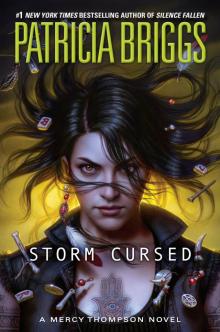 Storm Cursed
Storm Cursed Shifting Shadows
Shifting Shadows Frost Burned
Frost Burned River Marked
River Marked Silence Fallen
Silence Fallen Fair Game
Fair Game Moon Called
Moon Called Fire Touched
Fire Touched Dead Heat
Dead Heat Blood Bound
Blood Bound Dragon Bones
Dragon Bones Night Broken
Night Broken The Hobs Bargain
The Hobs Bargain Ravens Shadow
Ravens Shadow Ravens Strike
Ravens Strike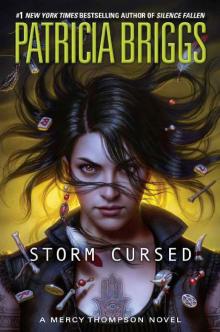 Storm Cursed (A Mercy Thompson Novel)
Storm Cursed (A Mercy Thompson Novel) Bone Crossed
Bone Crossed Dragon Blood
Dragon Blood Smoke Bitten: Mercy Thompson: Book 12
Smoke Bitten: Mercy Thompson: Book 12 Smoke Bitten
Smoke Bitten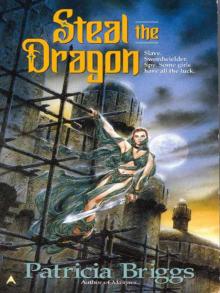 Steal the Dragon
Steal the Dragon 0.5 On The Prowl (alpha and omega)
0.5 On The Prowl (alpha and omega) Alpha and Omega
Alpha and Omega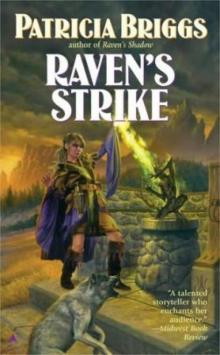 Raven's Strike rd-2
Raven's Strike rd-2![[Mercy 03] - Iron Kissed Read online](http://i1.bookreadfree.com/i/03/24/mercy_03_-_iron_kissed_preview.jpg) [Mercy 03] - Iron Kissed
[Mercy 03] - Iron Kissed Raven's Shadow rd-1
Raven's Shadow rd-1 Frost Burned mt-7
Frost Burned mt-7 Dragon Bones h-1
Dragon Bones h-1 Shifting Shadows: Stories from the World of Mercy Thompson
Shifting Shadows: Stories from the World of Mercy Thompson Silver Borne mt-5
Silver Borne mt-5 Wolfsbane s-2
Wolfsbane s-2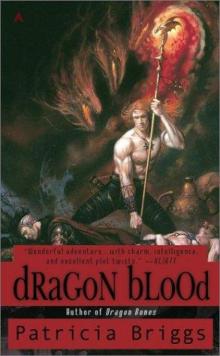 Dragon Blood h-2
Dragon Blood h-2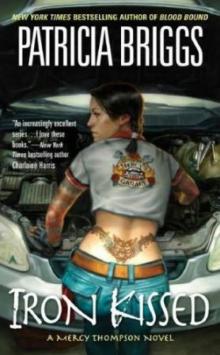 Iron Kissed mt-3
Iron Kissed mt-3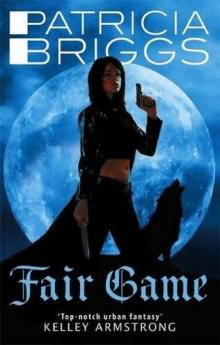 Fair Game aao-3
Fair Game aao-3 Masques s-1
Masques s-1![[Hurog 01] - Dragon Bones Read online](http://i1.bookreadfree.com/i1/04/03/hurog_01_-_dragon_bones_preview.jpg) [Hurog 01] - Dragon Bones
[Hurog 01] - Dragon Bones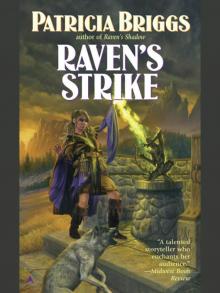 Raven s Strike
Raven s Strike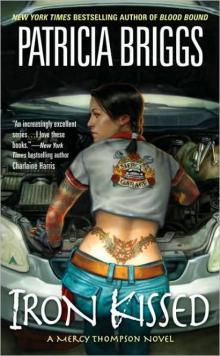 Mercedes Thompson 03: Iron Kissed
Mercedes Thompson 03: Iron Kissed Bone Crossed mt-4
Bone Crossed mt-4 Blood Bound mt-2
Blood Bound mt-2![[Mercy 01] - Moon Called Read online](http://i1.bookreadfree.com/i2/04/09/mercy_01_-_moon_called_preview.jpg) [Mercy 01] - Moon Called
[Mercy 01] - Moon Called River Marked mt-6
River Marked mt-6 The Mercy Thompson Collection
The Mercy Thompson Collection Moon Called mt-1
Moon Called mt-1 Mercy Thompson 8: Night Broken
Mercy Thompson 8: Night Broken